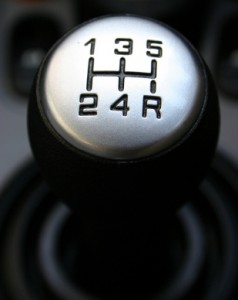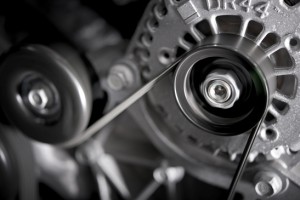Its that time of year again. School is about to start up, and last minute vacations are close at hand. Before you head out on the open road for a funfilled weekend, make sure your car is in top shape with these maintenance tips.
- Service your battery. When is the last time you changed out your battery? Batteries don’t last forever. If yours is three years old or older, you may want to test it or replace it to avoid unexpected trouble. AAA has reported that they assist on average around 1.6 million motorists with dead batteries during the summer months, and replace around 500,000 of them at roadside. Don’t be one of the statistics.
- Air conditioning check. While we haven’t had exceptionally hot weather here in weeks, out on the road may be a different story. In a short period of time, you can find yourself in intense heat with the sun beating through the windows – and no coolness coming out of your vents. Air conditioning systems typically don’t require routine maintenance, but if your system isn’t working well to begin with, an intense trip may be the ticket for failure. One of our mechanics can perform an AC inspection to check out your system, including compressor, belts, hoses and the temperature and cooling system.
- Tire check. No one anticipates a flat tire. But its even more of a hassle when you’re miles from the nearest exit and you have to pull out luggage to reach the spare. When it comes to checking tires, even newer tires should have a once over before a big trip. Check the pressure of each tire when the tires are cold and the car hasn’t been driven in a while. Make sure the pressure is at the recommended level. Also inspect the tread depth and overall condition of the tires. Yes, that small nail can be a problem – have it checked before you head out.
- Are you fully prepared? While preventative measures will help tip the scales in your favor, accidents are called accidents for a reason. There is always opportunity for problems along the way. Make sure you have an emergency roadside kit that is appropriate for the season and the areas you are going to. While you will probably have many mobile phones in the car, make sure you have chargers that work in your vehicle as well. Flashlights, first aid kits, drinking water, snacks and food, booster cables, standard tools such as a wrench, and emergency flares or reflectors should be included in any kit.
- Windshield wipers and fluid. Did you know the average windshield wiper lasts anywhere from six to twelve months? While you may experience dry conditions in Colorado, if your trip takes you to other states, you may be faced with a variety of seasonal elements, including rain and dirt. Will your current wipers hold up in extreme situations and provide you with the ability to see clearly? Do you have plenty of washer fluid in case you hit a variety of elements? Carry an extra gallon with you, especially for longer trips.
- Inspect belts, hoses and fluids. The older the car, the more potential you’ll have for problems. Belts only last so long before they begin showing signs of wear, cracks, frays, or become brittle or excessively soft. Clamps can lose their tightness over time, allowing leaks and drips to begin. Fluids also begin to flow quicker as a car ages. The older your car, the more maintenance-friendly checks should be made throughout the year to ensure your car is in good working order.
- Always plan and prepare. While the idea of a vacation is to get away from it all, don’t disappear without anyone knowing where you are going. Plan out your trip in advance, and map out your routes and patterns. Stick to your schedule as much as possible, and let a family member or friend know of your plans. Check in occasionally, especially for longer trips, so they know you’re okay.

 When it comes down to it, a car is a car. Yes, hybrids operate a little differently than your standard gasoline model. But hybrids still have a regular gas engine along with their electric aspects. Which means they will need routine maintenance just like any other gas vehicle on the road today.
When it comes down to it, a car is a car. Yes, hybrids operate a little differently than your standard gasoline model. But hybrids still have a regular gas engine along with their electric aspects. Which means they will need routine maintenance just like any other gas vehicle on the road today. In order to make sure your car is in top shape, don’t wait for a problem to occur. Instead, find a neighborhood car repair shop you can trust; one that will help you keep your car in great shape, and one that will give you reliable transportation for many years to come.
In order to make sure your car is in top shape, don’t wait for a problem to occur. Instead, find a neighborhood car repair shop you can trust; one that will help you keep your car in great shape, and one that will give you reliable transportation for many years to come. Unfortunately, criminals are getting more sophisticated in the way they prey on those that may be disadvantaged in some way. If a 75 year old woman always relied on her husband for maintaining the cars, her new “job” may be completely overwhelming, and she quickly trusts anyone who provides a smile and a simple “I understand”. Which of course may not be in her best interests.
Unfortunately, criminals are getting more sophisticated in the way they prey on those that may be disadvantaged in some way. If a 75 year old woman always relied on her husband for maintaining the cars, her new “job” may be completely overwhelming, and she quickly trusts anyone who provides a smile and a simple “I understand”. Which of course may not be in her best interests. So, instead of buying new, people are finding ways to take better care of their current car to extend its life. The maintenance is worth the money because more and more cars are staying on the highway well past 100,000 miles. Here are some tips to help you keep your current car rolling down the road.
So, instead of buying new, people are finding ways to take better care of their current car to extend its life. The maintenance is worth the money because more and more cars are staying on the highway well past 100,000 miles. Here are some tips to help you keep your current car rolling down the road. Regular maintenance can keep your car running at maximum efficiency. Just like everything in life, your car needs a little TLC to keep it at max performance. Performing regular, scheduled maintenance can keep your engine cleared out and running well, your tires full and functioning properly, your transmission in peak performance, etc.
Regular maintenance can keep your car running at maximum efficiency. Just like everything in life, your car needs a little TLC to keep it at max performance. Performing regular, scheduled maintenance can keep your engine cleared out and running well, your tires full and functioning properly, your transmission in peak performance, etc. Some cars are fancy, some are not; but they all have one thing in common…they get us where we want to go. Unfortunately, we tend to underestimate the needs of the car until much too late. Sometimes this means we are stuck with a costly bill that could be avoided, and other times, this means we are stranded at the side of the road wondering what to do. If you want to keep your car in good working condition, start being proactive in your car repair needs.
Some cars are fancy, some are not; but they all have one thing in common…they get us where we want to go. Unfortunately, we tend to underestimate the needs of the car until much too late. Sometimes this means we are stuck with a costly bill that could be avoided, and other times, this means we are stranded at the side of the road wondering what to do. If you want to keep your car in good working condition, start being proactive in your car repair needs. Yet your fuel system is actually a sophisticated system that keeps your entire automobile in good working condition. Think of it as the food to keep your car running. If any one of the parts breaks down, your engine will not run.
Yet your fuel system is actually a sophisticated system that keeps your entire automobile in good working condition. Think of it as the food to keep your car running. If any one of the parts breaks down, your engine will not run.
